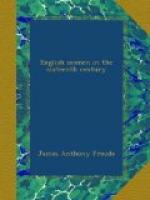Of all the famous Elizabethans Sir Walter Raleigh is the most romantically interesting. His splendid and varied gifts, his chequered fortunes, and his cruel end, will embalm his memory in English history. But Raleigh’s great accomplishments promised more than they performed. His hand was in everything, but of work successfully completed he had less to show than others far his inferiors, to whom fortune had offered fewer opportunities. He was engaged in a hundred schemes at once, and in every one of them there was always some taint of self, some personal ambition or private object to be gained. His life is a record of undertakings begun in enthusiasm, maintained imperfectly, and failures in the end. Among his other adventures he had sent a colony to Virginia. He had imagined, or had been led by others to believe, that there was an Indian Court there brilliant as Montezuma’s, an enlightened nation crying to be admitted within the charmed circle of Gloriana’s subjects. His princes and princesses proved things of air, or mere Indian savages; and of Raleigh there remains nothing in Virginia save the name of the city which is called after him. The starving survivors of his settlement on the Roanoke River were taken on board by Drake’s returning squadron and carried home to England, where they all arrived safely, to the glory of God, as our pious ancestors said and meant in unconventional sincerity, on the 28th of July, 1586.
The expedition, as I have said, barely paid its cost. In the shape of wages the officers received nothing, and the crews but a few pounds a man; but there was, perhaps, not one of them who was not better pleased with the honour which he had brought back than if he had come home loaded with doubloons.
Startled Catholic Europe meanwhile rubbed its eyes and began to see that the ‘enterprise of England,’ as the intended invasion was called, might not be the easy thing which the seminary priests described it. The seminary priests had said that so far as England was Protestant at all it was Protestant only by the accident of its Government, that the immense majority of the people were Catholic at heart and were thirsting for a return to the fold, that on the first appearance of a Spanish army of deliverance the whole edifice which Elizabeth had raised would crumble to the ground. I suppose it is true that if the world




